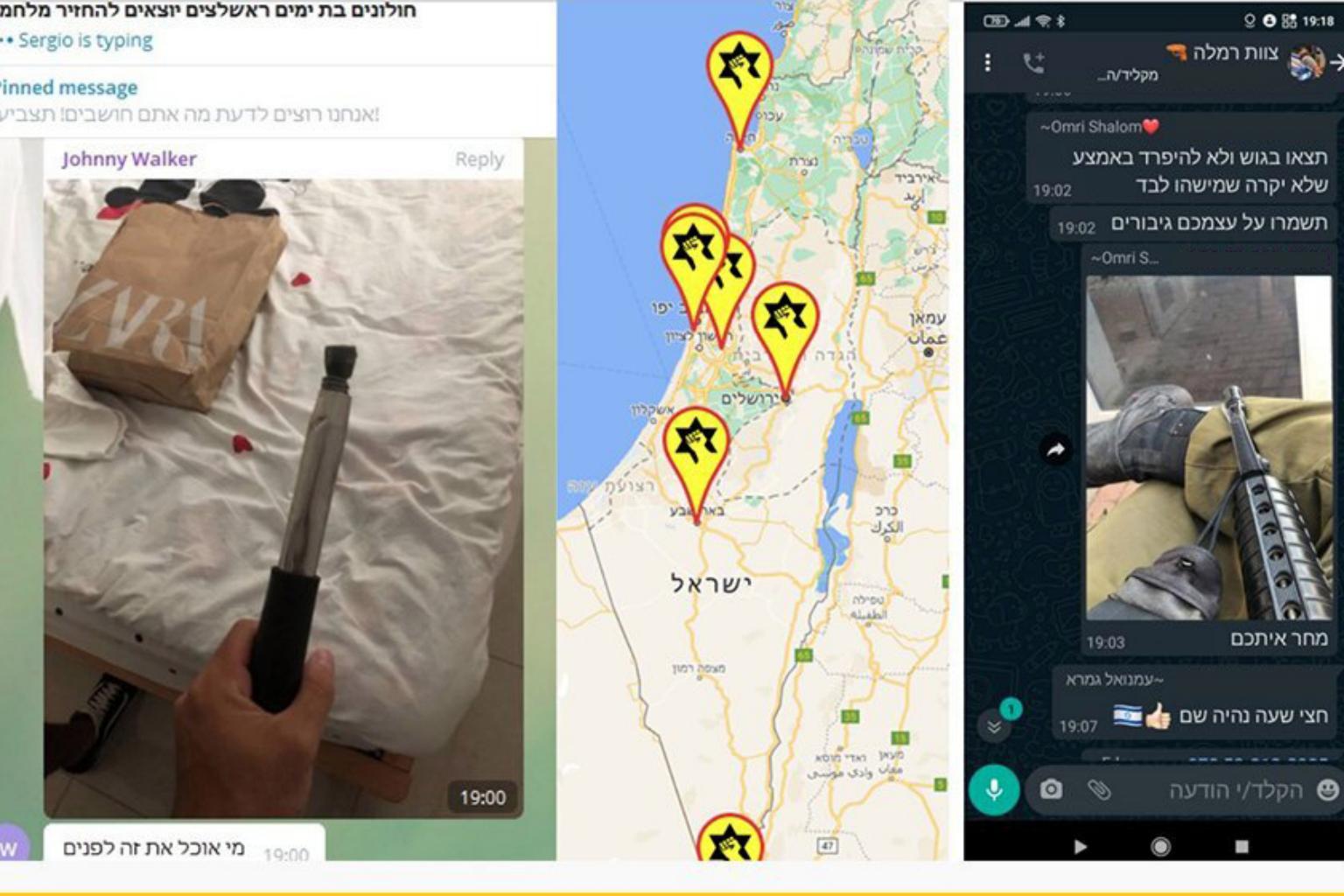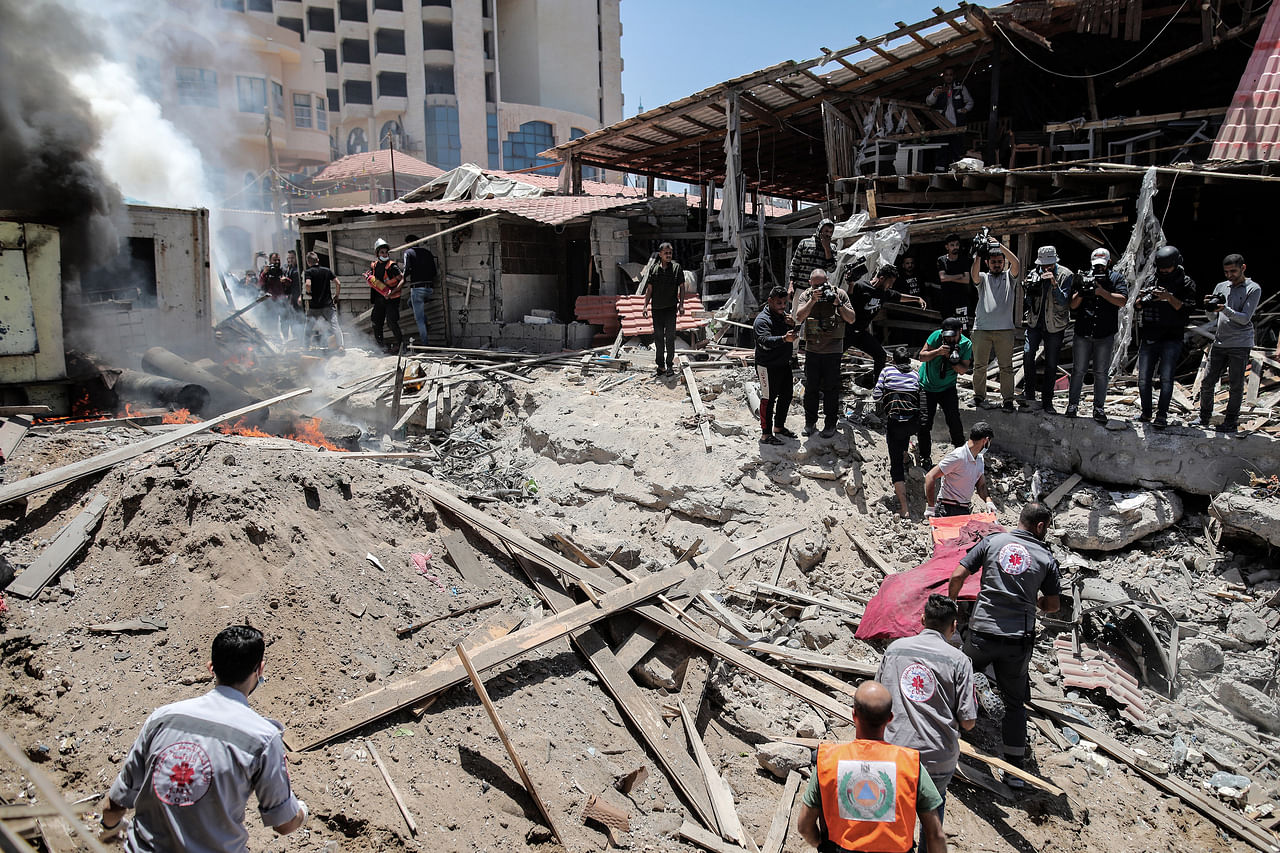NEW YORK (NYTIMES) - On May 12, a message appeared in a new WhatsApp channel, called "Death to the Arabs". The message urged Israelis to join a mass street brawl against Palestinian citizens of Israel.
Within hours, dozens of other new WhatsApp groups popped up with variations of the same name and message. The groups soon organised a 6pm start time for a clash in Bat Yam, a town on Israel's coast.
"Together we organise and together we act," read a message in one of the WhatsApp groups. "Tell your friends to join the group, because here we know how to defend Jewish honour."
That evening, live scenes aired of black-clad Israelis smashing car windows and roaming the streets of Bat Yam. The mob pulled one man they presumed to be Arab from his car and beat him unconscious. He was hospitalised in serious condition.
The episode was one of dozens across Israel that the authorities have linked to a surge of activity by Jewish extremists on WhatsApp, the encrypted messaging service owned by Facebook.
Since violence between Israelis and Palestinians escalated last week, at least 100 new WhatsApp groups have been formed for the express purpose of committing violence against Palestinians, according to an analysis by The New York Times and FakeReporter, an Israeli watchdog group that studies misinformation.
The WhatsApp groups, with names like "The Jewish Guard", have added hundreds of new members a day over the past week, according to The Times' analysis. The groups, which are in Hebrew, have also been featured on e-mail lists and online message boards used by far-right extremists in Israel.
While social media and messaging apps have been used in the past to spread hate speech and inspire violence, these WhatsApp groups go further, researchers said. That is because the groups are explicitly planning and executing violent acts against Palestinian citizens of Israel, who make up roughly 20 per cent of the population and live largely integrated lives with Jewish neighbours.
That is far more specific than past WhatsApp-fuelled mob attacks in India, where calls for violence were vague and generally not targeted at individuals or businesses, the researchers said.
Even the Stop the Steal groups in the United States that organised the Jan 6 protests in Washington did not openly direct attacks using social media or messaging apps, they said.

The proliferation of these WhatsApp groups has alarmed Israeli security officials and disinformation researchers.
In the groups, attacks have been carefully documented, with members often gloating about taking part in the violence, according to The Times' review. Some said they were taking revenge for rockets being fired at Israel from militants in the Gaza Strip, while others cited different grievances. Many solicited names of Arab-owned businesses they could target next.
"It is a perfect storm of people empowered to use their own names and phone numbers to openly call for violence, and having a tool like WhatsApp to organise themselves into mobs," said Mr Achiya Schatz, director of FakeReporter.
He said his organisation had reported many of the new WhatsApp groups to Israeli police, who initially took no action "but now are starting to act and try to prevent the violence".
Mr Micky Rosenfeld, a spokesman for the Israeli police, said: "Police are tracking social media and monitoring movements on the ground."
He said that while Israelis have been involved in some attacks, they were largely "protecting themselves" against attacks by Palestinian citizens of Israel. "Police investigations are continuing," he said.
Israeli security officials said law enforcement authorities began monitoring the WhatsApp groups after being alerted by FakeReporter. The police believed attacks by the Jewish extremists were inflamed by and organised on the WhatsApp groups, said FakeReporter's Mr Schatz.
One official, who spoke on condition of anonymity, added that the police had not seen similar WhatsApp groups forming among Palestinians. Islamic movements, including Hamas, the militant Palestinian organisation that controls the Gaza Strip, have long organised and recruited followers on social media but do not plan attacks on the services for fear of being discovered.
A WhatsApp spokesman said the messaging service was concerned by the activity from Israeli extremists. She said the company had removed some accounts of people who participated in the groups.
WhatsApp cannot read the encrypted messages on its service, she added, but it has acted when accounts were reported to it for violating its terms of service.
"We take action to ban accounts we believe may be involved in causing imminent harm," she said.
In Israel, WhatsApp has long been used to form groups so people can communicate and share interests or plan school activities.
As violence soared between Israel's military and Palestinian militants in Gaza over the past week, WhatsApp was also one of the platforms where false information about the conflict has spread.

Tensions in the area ran so high that new groups calling for revenge against Palestinians began emerging on WhatsApp and on other messaging services such as Telegram. The first WhatsApp groups appeared on May 11, Mr Schatz said. By May 12, his organisation had found dozens of the groups.
People can join the groups through a link, many of which are shared within existing WhatsApp groups. Once they have joined one group, other groups are advertised to them.
The groups have since grown steadily in size, Mr Schatz said. Some have become so big that they have branched off into local chapters that are dedicated to certain cities and towns. To evade detection by WhatsApp, organisers of the groups are urging people to vet new members, he said.
On Telegram, Israelis have formed roughly 20 channels to commit and plan violence against Palestinians, according to FakeReporter. Much of the content and messaging in those groups imitates what is in the WhatsApp channels.
Over the weekend, Israeli Prime Minister Benjamin Netanyahu visited Lod, a mixed Jewish-Arab city in central Israel that has been the scene of recent clashes.
"There is no greater threat now than these riots, and it is essential to bring back law and order," Mr Netanyahu said.
Within some of the WhatsApp groups, Mr Netanyahu's calls for peace were ridiculed.
"Our government is too weak to do what is necessary, so we take it into our own hands," wrote one person in a WhatsApp group, dedicated to the city of Ramle in central Israel. "Now that we have organised, they can't stop us."

